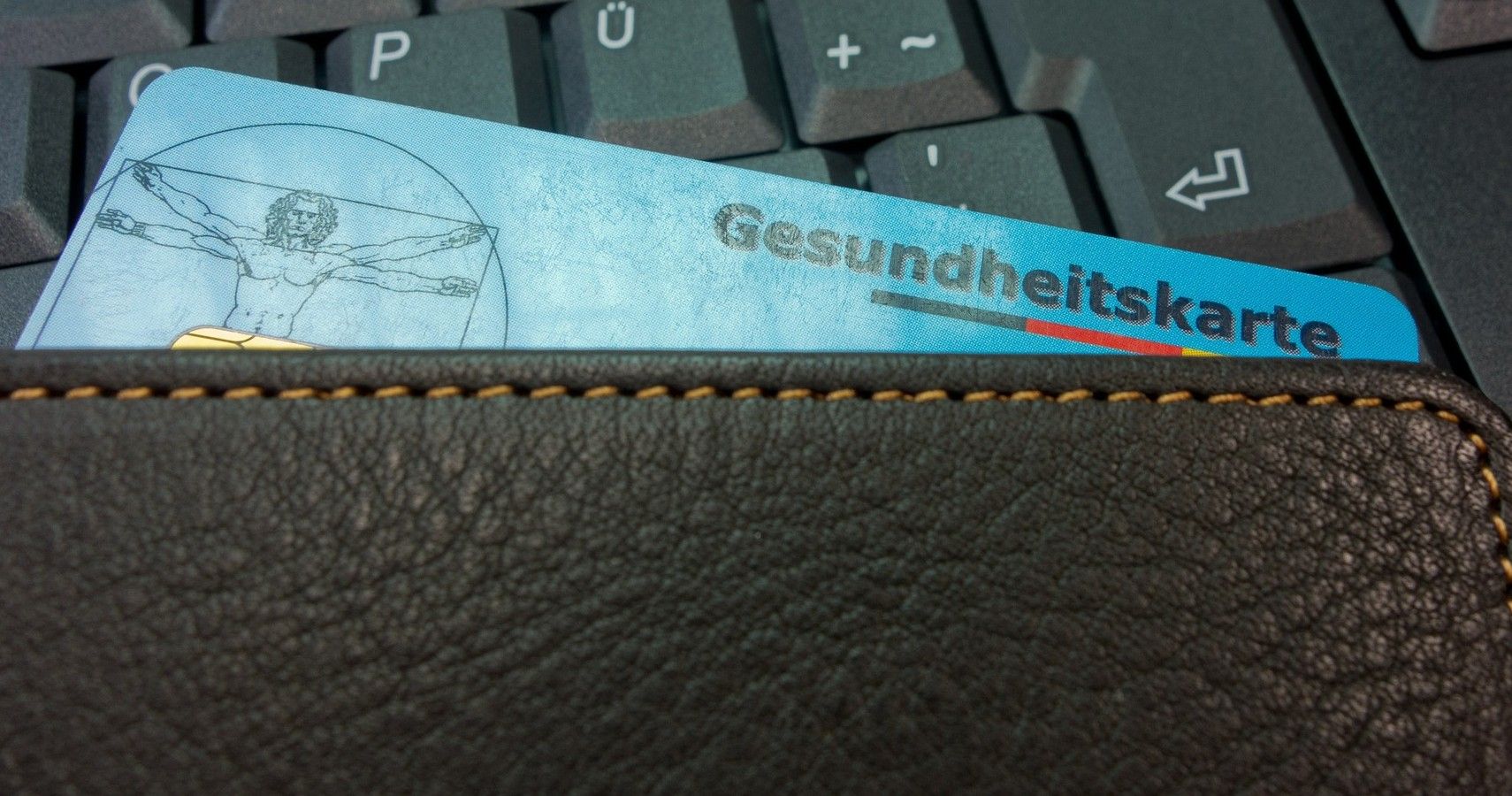The COVID-19 pandemic has sent healthcare systems reeling. Now, the prospect of digital health passports and smart health cards are gathering pace as governments and businesses alike attempt to return to normality.
So, what is a smart health card, and is it the same as a health passport?
What Is a Smart Health Card?
A smart health card is a thin plastic with an embedded integrated circuit chip containing encrypted data.
What makes it smart is the chip that acts as a supercomputer. The chip can be programmed to perform different actions with numerous applications, while readers connected to a computer system can access or update the chip’s data.
It may look just like a credit card, but it functions differently. Used in many countries across Europe and worldwide, a smart health card stores healthcare information, insurance coverage, and other vital medical data.
Advantages of Using a Smart Health Card
Among many other advantages of using this system, the most crucial is improving critical or emergency care. Smart health cards provide immediate access to a patient’s health data or medical records in emergencies.
For instance, an emergency responder with a portable card reader will have immediate information about the patient while in the ambulance en route to the hospital. This is even more important when the patient is unconscious, unresponsive, or simply unable to tell the responder his health care information.
Imagine a responder who can forward critical patient data to emergency room staff before the ambulance arrives. It will help ER staff prepare what’s needed to treat the patient even before arrival.
Fast and efficient patient data transfer during critical care can greatly improve response time, thereby saving lives.
Seamless Transfer of Data
Using this system also provides a more accurate and fluid transfer of patient information from the emergency room staff to healthcare providers in in-patient care.
Physicians won’t have to rely on patient’s memory to retrieve critical medical data, which reduces the chances of error. Aside from this, a smart health card system offers a seamless exchange of patient information between physicians.
It decreases the chances of leaking critical patient data (which may be used for identity theft). This often happens when patient information is shared via fax, phone, or email.
Easier Storage and Retrieval of Medical Records
The system provides patients with a convenient, hassle-free way to carry laboratory test results or doctor’s notes.
It’s like having a database of healthcare information—previous tests, treatments, and files for insurance coverage—in a small card in the patient’s wallet. No more need to lug around pieces of paper for a doctor’s appointment.
Reduces Medical Errors and Duplicate Testing
The country’s healthcare system can even benefit from this since medical errors, and duplicate tests can be avoided. Medical errors that come with improper data entry, language barriers, or miscommunication can be minimized through this system.
Human error can sometimes cause a mismatch of patients and records. Having a smart health card allows healthcare providers to match the patient with the correct health records easily. This decreases the chances of having duplicate records or multiple redundant tests, which could cost a lot of money. It could save the health care system unnecessary expenses.
More Accurate Verification of Insurance Coverage
Medical identity theft has become a serious problem in recent years. The crime involves the fraudulent use of health insurance information to access healthcare services or receive reimbursement. Simply put, a person who is not covered by a policy can steal someone else’s health insurance information to get benefits.
Health care or health insurance system breaches often leak sensitive personally identifiable information (PII) that hackers can sell on the dark web. PII can include health insurance information.
This is what thieves use to access healthcare services they shouldn’t have access to. They can buy prescription drugs or file fraudulent insurance claims for procedures that were never performed.
A smart health card system can prevent all these since most use authentication and security protocols. Some can use 2-factor authentication (2FA) or multi-factor authentication (MFA), while others have a biometrics feature that checks for the patient’s fingerprints to verify their identity.
Disadvantages of Using a Smart Health Card System
Privacy issues remain the biggest concern that deters users from adapting technology for medical purposes. Many have raised concerns over giving people easy access to a multitude of sensitive data like treatments, illness records, and medications. And with news of healthcare and insurance systems becoming victims of data breaches, these concerns aren’t exactly unfounded.
Having all records in one place can be convenient, but a single data breach could land highly sensitive data in the wrong hands.
Creating Digital Divide
Then there’s the issue of creating a digital divide. Many argue that smart health cards can only be used by hospitals and communities with access to the system. To take advantage of this technology, a hospital’s machine must support the same software, smart card reader interface, and must be able to support the necessary hardware.
Speaking of hardware, there’s also the question of additional costs. The hardware for the system, software for the reader, and the network with the database could cost millions and could cost even more to maintain. Even the plastic cards themselves cost money to produce.
Who’s going to foot the initial investment? Furthermore, how long before this initial investment reaps benefits for the government and its citizens?
Bugs And Power Failures
Of course, this kind of technology isn’t immune to bugs and glitches or cyber-attacks that can cause data leaks. A single unpatched device in the system can become a gateway for malware that can cause damage to the network and database.
There are also concerns over power outages. How can this be sustained in communities with limited power or power infrastructure issues? Even the most sophisticated power systems can fail in major disasters. Imagine not having access to medical data during a disaster.
Smart Healthcare Vs. Digital Vaccination Passport
There have been talks of a digital vaccination passport for travel and access to concerts or gatherings post-Covid. While a digital health passport might seem similar to the smart health cards used in countries like Germany, France, and Austria, there are key differences.
First, the digital COVID-19 vaccine passport will come in the form of a digital certificate downloaded onto a person’s phone. The digital certificate or Covid vaccine passport is a pass with the patient’s name and details of their Covid vaccine (date administered, vaccine manufacturer, location of vaccination). It’s a one-page digital document with a barcode or QR code that can be scanned at points of entry.
Unlike the smart health card, the digital health passport is not meant to be a physical plastic card.
It will only have information relating to the person’s COVID-19 tests, vaccination records, and healthcare facilities where those vaccinations and tests were conducted. It will not have the patient’s entire medical history.
These digital health passports will give people access to gatherings like concerts and workplaces where they will be in contact with many people or give them entry to countries once travel gets some sense of normalcy. People with no smartphone can print out their codes, scanned at the point of entry.
Breach of Privacy and Curtailment of Human Rights
While many are eager to get the jab, download a digital vaccination passport, and get back to normal, some are sounding the alarm about the possible repercussions of introducing this technology. Experts and human rights advocates are warning developers to address potential data privacy and human rights issues a vaccination passport could bring.
Research published by the University of Exeter Law School warns how this passport could curtail fundamental human rights, including the right to privacy, freedoms of movement, and peaceful assembly.
According to the report, the problem comes from the passport’s use of sensitive personal health information (how will this be stored, who will have access to it?) and how it can create a new divide between people based on their health status.
The passport can also potentially determine or limit the degree to which a person enjoys rights and freedoms. The use of digital health passports, experts warn, could deepen the inequalities between communities that have immediate access to vaccines or health passports and those that do not.
Future of Healthcare
Countries like France have been using smart health cards since the 90s, with other countries following suit in the early 2000s.
Adoption of this technology has been rather slow in countries like the US, stating privacy issues as the primary concern. While there are many advantages to adopting this system, there are also several disadvantages that warrant careful consideration.
About The Author

